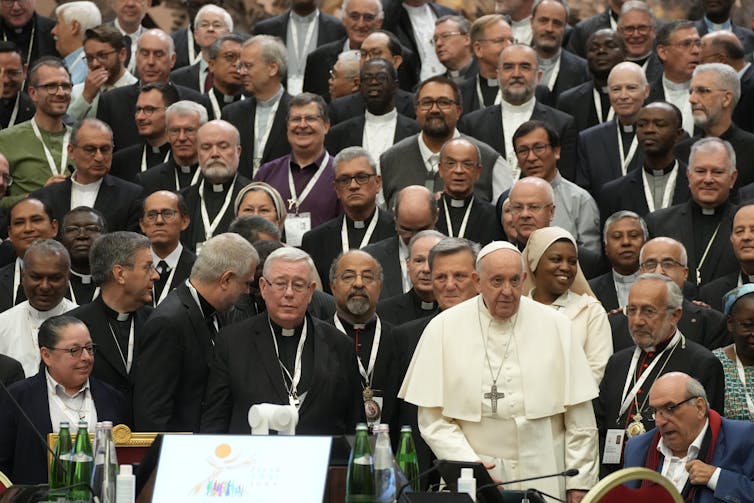Greenwich council are endangering the lives of residents in new-build flats.
For six months, residents at the Ignatius Sancho Road Estate in Kidbrooke have complained of blocked fire escapes, dust from construction sites causing serious health issues, and hazardous air filters that completely contravene fire safety laws.
Greenwich council: putting tenants at risk?
Zkiah Smith is 34 and disabled. She moved into the building in November 2024. Shortly after, she started to experience a “serious deterioration” in her “physical health, emotional wellbeing and daily functioning” due to:
poor indoor air quality, unresolved building issues, and close proximity to an unshielded, dust-producing construction site.
Zkiah told the Canary:
Since living in this flat I have noticed my health drastically decline.
I’ve had a constant runny nose and bloody nose. Excessive sneezing. Sores inside my nose. Extreme nasal swelling to the point I can’t breathe out of my nose at all and was diagnosed with severe allergic rhinitis. I have had a near constant cough, itchy eyes, headaches, repeated illnesses, dry skin, splitting lips. I was diagnosed with a significant birch tree pollen allergy and allergy to apples, things that were not an issue until I lived here. I have had breathing difficulties, tight chest, sore throat and severe sleep disturbances.
I have also have my pre existing conditions exasperated, such as joint pain and inflammation and anxiety. I have had days where my face and eyes swelled up.
Other tenants have also reported serious health concerns, including:
asthma attacks, nosebleeds, breathing problems, hives, fatigue, and repeated hospital visits since being tenants of this block.
A letter from a specialist doctor confirmed that the conditions insider Zkiah’s flat are significantly impacting her health. She said:
I have been diagnosed with Alpha-1 antitrypsin deficiency, a genetic lung vulnerability that places me at significant risk of permanent damage from prolonged exposure to airborne pollutants. I have also developed new allergies and significant worsening of pre-existing conditions since moving into this property.
Zkiah told the Canary:
I began asking other tenants and very quickly discovered most people were experiencing similar symptoms.
This is no longer about just one case — this is a building-wide environmental health crisis.
Physically inaccessible
Zkiah invested in her own personal air purifiers. However, when they became clogged after only three weeks instead of the six months they should last, she realised the environment was making her sick:

Despite Zkiah’s documented health conditions and the known risks from construction sites, the council placed her next to an active building site, with no protective measures. It wasn’t until months after she moved in that the council told her about the built in Mechanical Ventilation with Heat Recovery (MVHR) system – which is meant to provide fresh, filtered air.
The council did not explain the system to her, and it requires regular cleaning, but due to her disabilities she physically cannot access it. Eventually, she discovered it was clogged with “thick grey dust and blackened filters”. One filter was missing altogether. Zkiah says this is a clear fire risk, yet the council had not inspected or checked the system since she moved in.

In emails seen by the Canary, a Housing Occupational Therapist in the Disability and Home Improvement Team from Greenwich council told Zkiah:
When you moved into the property you would’ve been given a handbook and in there, there should be information regarding the MVHR and how to change the filter. It’s advised that residents change this filter themselves – maybe your friend would be able to help with this?
According to the Landlord and Tenant act [1985], it it the landlords legal responsibility to maintain ventilation systems. This includes the proper functioning of ventilation systems.
Make your mind up
In emails seen by the Canary the same occupational therapist provided a screenshot of part of an agreement, supposedly signed by tenants. Zkiah claims the council never asked her to sign one. Additionally, the form – which a ten year old could have created on Microsoft Word – references ‘Lettings Birchmere’ – which is not even the estate that Zkiah lives in.
This raises the question of whether the council are using the same filters and not maintaining them in other properties.

In footage exclusive to the Canary, Zkiah captured subcontractors from I-MEX along with Greenwich council’s housing liaison officer discussing the MVHR units.
I-MEX subcontractors can be heard saying the power should be turned off the units before they are cleaned. After going back on that, they are then heard saying “you should always isolate electrical stuff before you try it.”
Additionally, Greenwich’s liaison officer confirms she wasn’t aware of that. Importantly, she has been telling vulnerable and disabled people to clean the units themselves, without turning them off.
In total, Zkiah had three I-MEX contractors, a Durkan liaison officer, and the Greenwich liaison officer to hoover two filters – which is totally normal behaviour. I think they know we’re watching.
In the footage, I-MEX also state that the outside vents don’t get checked as it would be “near enough impossible”.
Since then, an independent ventilation expert has verified that the outside vents should in fact be checked and maintained regularly, which you can hear in the video.
Fire safety risks
As if clogged MVHR units wasn’t enough – the units are also housed alongside tumble dryers in unventilated rooms with no window – according to the manufacturer instructions. Fire doors are also frequently malfunctioning during fire drills.

Back in January, Zkiah also raised the malfunctioning fire doors with the council. One night she got stuck outside, in the cold, in her wheelchair. Eventually, the fire brigade had to smash the locks as it was a fire hazard, and even an engineer could not fix it. This raises questions about the depth of inspections and planning that has gone into the building. What would happen in the event of a fire if the doors malfunction?
Disability access under Greenwich council
Greenwich council claim Zkiah’s flat is a “fully wheelchair accessibly property” – however her mobility scooter will not fit the corridors on her floor of the building. The council told her via email:
We also have to make it clear that the property is not suitable for your current mobility scooter.

In a separate email, they stated:
[property number] is not suitable for the mobility scooter that you have. It is a fully wheelchair accessible property and part of the most accessible housing stock we have. We certainly understand why your scooter is so important to your independence, but it is essentially an outdoor vehicle and it is not realistic to expect you will easily find a property that accommodates your scooter in social housing in this Borough.
How can a property be fully wheelchair accessible, if one of the most commonly used disability aids will not fit?
Ultimately, Zkiah had no other option than to accept the flat.
Greenwich council says…
In a comment to the Canary, a Greenwich council spokesperson said:
Everyone should have access to a safe and secure home that meets their needs. Through Greenwich Builds we are delivering 1,750 sustainable new council homes – the most in a generation – for local people on our waiting list.
At Ignatius Sancho Road have built 122 new homes and a further 330 are under construction including much needed 3-bed and 4-bed family homes that are set to be finished by the end of next year.
We understand that living next door to building work can be disruptive. Tenants would have been aware that parts of the development were still under construction when they signed their tenancy agreement. Each home has mechanical vents, that are fully in line with building regulations and approved by Building Control, to make sure our new developments are as sustainable as possible, which is greener for the environment and better for the residents who call them home.
As part of the tenancy agreement, tenants accept responsibility for cleaning dust and debris from the vents of their home every few months, however we will service the filters on behalf of vulnerable and disabled tenants – now this has been brought to our attention. We are aware of concerns about the door entry system and we are working to address them with the contractor as swiftly as possible.
At risk and an afterthought
Zkiah says Greenwich council have not only broken the Landlords and Tenants Act [1985], but are also in violation of numerous fire safety laws and safety and quality standards.
She has created an Instagram account to unite residents facing similar issues. However, residents shouldn’t have to fight their councils just to have habitable, safe, social housing. It’s a damning indictment that Greenwich council has left Zkiah in such terrible living conditions.
They are not only inaccessible, but actively harmful to her health. Once again, the safety of residents in social housing is being put at risk – and the lack of housing availability is not an excuse. But as usual, the needs of disabled people are an afterthought – as Zkiah’s experience demonstrates all too well.
By HG
This post was originally published on Canary.

 (@tanita_tikaram)
(@tanita_tikaram) 



 Sky 501, Virgin 602
Sky 501, Virgin 602 

 Disability benefit cuts impossible to support, 42 Labour MPs tell Starmer
Disability benefit cuts impossible to support, 42 Labour MPs tell Starmer




